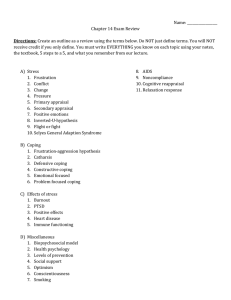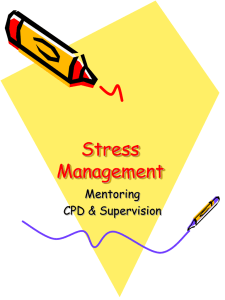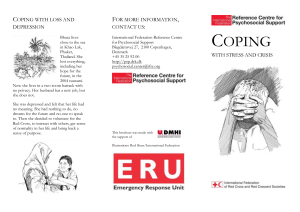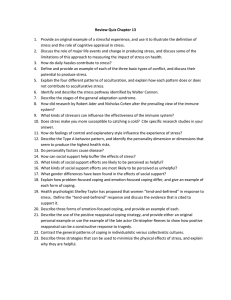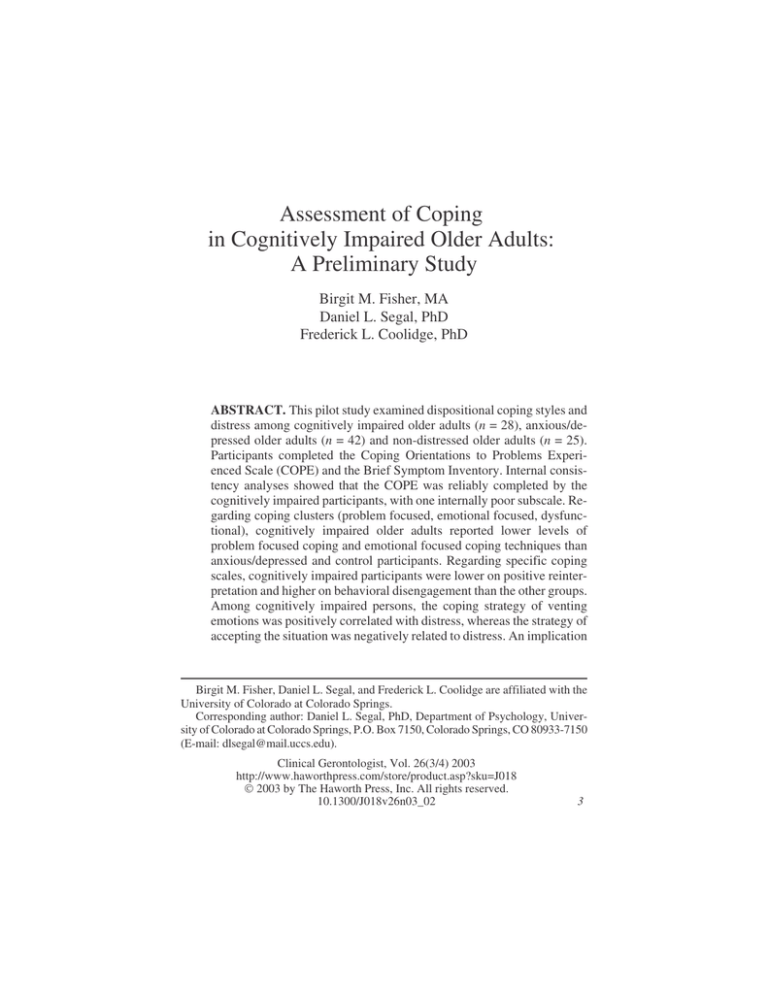
Assessment of Coping
in Cognitively Impaired Older Adults:
A Preliminary Study
Birgit M. Fisher, MA
Daniel L. Segal, PhD
Frederick L. Coolidge, PhD
ABSTRACT. This pilot study examined dispositional coping styles and
distress among cognitively impaired older adults (n = 28), anxious/depressed older adults (n = 42) and non-distressed older adults (n = 25).
Participants completed the Coping Orientations to Problems Experienced Scale (COPE) and the Brief Symptom Inventory. Internal consistency analyses showed that the COPE was reliably completed by the
cognitively impaired participants, with one internally poor subscale. Regarding coping clusters (problem focused, emotional focused, dysfunctional), cognitively impaired older adults reported lower levels of
problem focused coping and emotional focused coping techniques than
anxious/depressed and control participants. Regarding specific coping
scales, cognitively impaired participants were lower on positive reinterpretation and higher on behavioral disengagement than the other groups.
Among cognitively impaired persons, the coping strategy of venting
emotions was positively correlated with distress, whereas the strategy of
accepting the situation was negatively related to distress. An implication
Birgit M. Fisher, Daniel L. Segal, and Frederick L. Coolidge are affiliated with the
University of Colorado at Colorado Springs.
Corresponding author: Daniel L. Segal, PhD, Department of Psychology, University of Colorado at Colorado Springs, P.O. Box 7150, Colorado Springs, CO 80933-7150
(E-mail: dlsegal@mail.uccs.edu).
Clinical Gerontologist, Vol. 26(3/4) 2003
http://www.haworthpress.com/store/product.asp?sku=J018
2003 by The Haworth Press, Inc. All rights reserved.
10.1300/J018v26n03_02
3
4
CLINICAL GERONTOLOGIST
of the study is that an assessment of coping may be useful in the early
stages of cognitive impairment. [Article copies available for a fee from The
Haworth Document Delivery Service: 1-800-HAWORTH. E-mail address:
<docdelivery@haworthpress.com> Website: <http://www.HaworthPress.com> © 2003
by The Haworth Press, Inc. All rights reserved.]
KEYWORDS. Cognitive impairment, coping, distress, dementia, intervention
Many studies of dementia have focused on diagnosis, clinical drug
studies, and the biological and etiological aspects of the disorder. An
important trend in the research involves including the patient as a conscious victim of the disease, a person capable of displaying emotions,
expressing fears, and communicating the struggle against a devastating
disorder (e.g., Bachman et al., 2000; Quayhagen & Quayhagen, 1996).
Indeed, there is growing evidence that support groups and cognitive-behavioral interventions are effective in building coping strategies and reducing distress among individuals with early stage dementia (see review
by Kasl-Godley & Gatz, 2000). Unfortunately, coping has infrequently
been assessed with standardized instruments. The purpose of the present study was to measure formally coping among cognitively impaired
older adults. We also examine subjective levels of distress in order to
explore how coping may relate to distress. Notably, Folkman and Lazarus (1988) noted that coping is a product of various cognitive processes
that manage negative feelings. Unfortunately, the decline in information processing in patients with a dementing illness is likely to affect
coping behaviors as well as subsequent psychiatric symptoms.
METHOD
Participants and Procedures
Cognitive Impairment Group. Initially, 53 older adults who presented
with cognitive problems at a local outpatient memory disorders assessment clinic were assessed by a multidisciplinary team (psychologist, social worker, occupational therapist, nurse practitioner). Of the original
group, 34 patients received a primary diagnosis of dementia based on
Fisher, Segal, and Coolidge
5
standardized diagnostic criteria specified by the Diagnostic and Statistical Manual of Mental Disorders–Fourth Edition (DSM-IV, American
Psychiatric Association, 1994). A packet of questionnaires was given to
each patient to be completed at home independently or with the help of
the primary caregiver. Six patients were excluded for failing to complete fully the questionnaires. The final cognitive impairment group
consisted of 28 persons (82% female; M age = 79.5 years, SD = 7.7;
range = 65 to 99 years; 89% Caucasian).
Anxious/Depressed Group and Control Group. To create comparison
groups for the cognitive impairment sample, an anxious/depressed group
and a control group were created. Purportedly, non-demented older
adults (n = 91) were gathered by asking undergraduate students to recruit family members or friends with no overt signs of cognitive impairment. These participants were then divided into two samples based on
their scores on the anxiety and depression subscales of the Brief Symptom Inventory (BSI; Derogatis, 1993) as follows: Participants who received a T-score of 60 or above on either the depression or anxiety
subscale of the BSI constituted the anxious/depressed group (n = 42;
64% female; M age = 64.4 years, SD = 6.8; range = 55 to 78 years; 93%
Caucasian). The remaining participants were screened for the presence
of psychological symptoms using the BSI. Participants who received a
T-score of 60 or above on any of the BSI subscales were excluded from
the study (n = 24), thus leaving a control group believed to be healthy
older adults (n = 25; 56% female; M age = 63.7 years, SD = 7.1; range =
55 to 79 years; 96% Caucasian).
Measures
Coping Orientations to Problems Experienced Scale (COPE; Carver,
Scheier, & Weintraub, 1989). The COPE scale is a 60-item, theoretically based, self-report questionnaire that assesses dispositional coping
styles in stressful situations. Answers are based on a four-point scale
from (1) not at all to (4) a lot. The COPE consists of three main clusters
(problem focused, emotional focused, and dysfunctional coping) with
five scales in each cluster and four questions per scale.
Brief Symptom Inventory (BSI; Derogatis, 1993). The BSI is a
53-item self-report symptom inventory that measures nine symptom dimensions and also includes a global index of distress, called the global
severity index (GSI).
6
CLINICAL GERONTOLOGIST
RESULTS
Reliability of COPE and BSI. The first analysis was conducted to assess the degree to which the cognitively impaired participants could reliably complete the COPE and BSI. Internal consistencies (Cronbach’s ␣)
were calculated separately for the cognitively impaired and non-cognitively
impaired (combining the anxious/depressed group and control group)
participants and compared to normative data (Carver et al., 1989;
Derogatis, 1993). For the 15 COPE subscales, the median reliability
was identical for the cognitively impaired group and the normative
sample (.71). For the non-demented group, the median reliability was
.67. Fisher’s z, a test for differences between independent correlations,
showed that the cognitively impaired participants performed significantly more poorly than the normative sample on only one scale, mental
disengagement (Cronbach’s ␣ = ⫺.02). For the 9 BSI subscales and the
GSI, the median reliabilities were as follows: cognitively impaired
group, .82; non-cognitively impaired group, .72; normative sample, .79.
Fisher’s z showed that the cognitively impaired participants performed
more poorly on two scales than the normative sample: interpersonal
sensitivity (Cronbach’s ␣ = .43) and somatization (Cronbach’s ␣ = .55).
Overall, results suggested that most of the subscales of the COPE and
BSI were reliably completed by cognitively impaired and non-cognitively
impaired groups.
Coping Analyses. Group differences on the three coping clusters
(problem focused, emotional focused, dysfunctional) were analyzed
with one factor analyses of variance (ANOVAs). Holm’s modification
of the Bonferroni correction was used to control for Type 1 error. Results (see Table 1) indicated significant main effects for groups regarding problem focused coping and emotional focused coping. Tukey’s
post hoc test showed that the cognitively impaired group reported lower
use of problem focused and emotional focused coping techniques than
both the control group and the anxious/depressed group, but the control
group did not differ from the anxious/depressed group. No group differences emerged for the dysfunctional coping cluster.
ANOVAs were also performed on each of the 15 COPE subscales to
further examine coping differences (see Table 1). Type 1 error was controlled by Holm’s modification of the Bonferroni correction. Main effects for group emerged for all five of the problem focused coping
subscales (active coping, planning, suppression, restraint, and instrumental support), one emotional focused subscale (reinterpretation), and
one dysfunctional subscale (behavioral disengagement). Tukey’s tests
Fisher, Segal, and Coolidge
7
revealed that the cognitively impaired group was lower than both the control and anxious/depressed groups on all five problem focused subscales,
whereas the latter two groups did not differ. For the reinterpretation
subscale, the cognitively impaired group was lower than the anxious/depressed group, which was lower than the control group. For the behavioral disengagement subscale, the cognitively impaired group was
higher than both the anxious/depressed and control groups, which did
not differ.
Finally, relationships between coping (the 15 subscales) and psychiatric distress (GSI scale of the BSI) among the cognitively impaired
group were examined by use of simple correlations (see Table 2). There
were two significant relationships: acceptance was negatively and moderately correlated with distress whereas venting of emotions was positively and strongly correlated with distress.
TABLE 1. ANOVA Results and Mean Scores Among Cognitively Impaired,
Anxious/Depressed, and Control Groups on the COPE
Control
F
p
41.3a
56.1b
57.2b
29.59
.000
Active Coping
9.4a
12.0b
12.3b
11.14
.000
Planning
7.7a
12.7b
13.6b
47.30
.000
Suppression
7.0a
10.5b
9.8b
21.98
.000
Restraint
9.0a
10.9b
11.3b
8.09
.001
Instrumental Support
8.1a
10.0b
10.3b
6.50
.002
Emotional Focused Cluster
45.7a
52.6b
55.5b
8.03
.001
8.1
9.3
9.8
2.53
.085
8.6a
COPE Scales
Problem Focused Cluster
Emotional Support
Cog./Impaired Anx./Dep.
11.8b
13.3c
28.37
.000
Acceptance
10.4
11.4
11.8
2.60
.080
Religion
11.4
12.0
11.8
0.02
.855
7.5
8.1
8.6
0.89
.415
33.4
31.9
30.0
2.66
.075
Venting
8.3
8.6
8.8
0.30
.739
Denial
5.8
5.1
4.6
2.68
.074
Behavioral Disengagement
7.3a
5.9b
5.3b
7.65
.001
Mental Disengagement
7.4
8.2
7.2
2.31
.105
Alcohol/Drug Abuse
4.6
4.1
4.1
1.78
.174
Reinterpretation
Humor
Dysfunctional Cluster
Note. Means with different superscripts differ significantly.
8
CLINICAL GERONTOLOGIST
TABLE 2. Correlations Among COPE Subscales with GSI Scores in the Cognitively Impaired Group
COPE Subscales
Active Coping
Planning
Suppression
Restraint
Instrumental Support
Emotional Support
GSI score
p value
⫺.04
.832
.08
.693
.08
.684
⫺.09
.642
.10
.601
.20
.316
Reinterpretation
⫺.25
.209
Acceptance
⫺.43
Religion
.14
.024*
.484
Humor
.09
.664
Focus on and Vent Emotions
.63
.000*
.19
.337
Denial
Behavioral Disengagement
Mental Disengagement
Alcohol/Drug Abuse
⫺.16
.428
.16
.421
⫺.07
.723
* = significant
DISCUSSION
Overall, this preliminary study suggests that dispositional coping
among those in the early stages of a dementing illness may be reliably
assessed with the COPE and that older adults with cognitive impairment may show deficits in their coping styles. Cognitively impaired
older adults reported lower levels of problem focused and emotional focused coping techniques compared to another clinical sample (older
adults with significant anxiety or depressive symptoms but no cognitive
impairment) and older adults with no psychological distress (our control group). More specifically, the cognitively impaired participants
used all five adaptive problem focused coping techniques and one adaptive emotional focused technique (positive reinterpretation of distressing events) less frequently than the anxious/depressed participants. The
cognitively impaired participants also reported a greater tendency to resort to avoidance coping (behavioral disengagement) to deal with
stressful events compared to the other groups.
Fisher, Segal, and Coolidge
9
Previous investigations into coping found that problem focused coping strategies, such as suppression of competing activities or seeking instrumental support from others, are used more often when the stressful
situation is perceived as controllable or changeable (Carver et al., 1989).
In problem focused coping, the sources of stress are directly confronted
by either changing one’s own problem-maintaining behavior or the environmental conditions that contributed to the stressor. The present results might reflect the sense of helplessness among the participants with
cognitive impairment as they experience an illness that makes their life
increasingly difficult to comprehend and control. This coincides with
other findings (Downe-Wamboldt & Melanson, 1995) showing that
coping choices of chronically ill older adults were influenced by how
they appraised their ability to manage a stressful situation. For some
cognitively impaired persons, the dementing illness may be perceived
as a problem outside the realm of their manageability, thus making
problem focused coping an unlikely choice. Furthermore, as the illness
progresses (as is the case in Alzheimer’s disease, the most common
form of dementing illness), the sophisticated cognitive processes necessary for problem focused coping might no longer be available to the person. An interesting question is: Does a person’s preferred method of
coping change with cognitive impairment or is the preferred method
blocked by the disability? We also found few coping differences between anxious/depressed and control participants, which might indicate
that our anxious/depressed participants, contrary to the cognitive impairment group, perceived themselves as capable of making personal or
situational changes despite their symptoms.
The emotional focused coping cluster was also lower among
cognitively impaired patients compared to the anxious/depressed and
control groups. Given that the complex demands of a given stressful encounter usually elicit cognitive and behavioral strategies that serve
problem solving as well as emotion-regulating functions (Folkman &
Lazarus, 1988), it is not surprising that emotional coping was primarily
used by participants who perceived themselves as able to control their
stressors. A follow-up analysis that separated this cluster into its individual coping strategies showed, however, that only positive reinterpretation of distressing events emerged as being used differently by our
three groups of participants. It is possible that the older adults with cognitive impairment may lack the cognitive resources to change their
mental perspective about their illness. The control group (defined as
having limited psychological distress) reported the highest use of this
10
CLINICAL GERONTOLOGIST
strategy, hinting that positive interpretation may be a powerful coping
tool.
Interestingly, the dysfunctional coping cluster was not used differently by the three groups. However, when subscales were examined, the
cognitively impaired participants resorted to behavioral disengagement
more frequently than anxious/depressed and control participants, which
may, in fact, be a sign of dementing illness itself (such as apathy) or a
psychological reaction to an illness that cannot be managed. Among the
different coping techniques, behavioral disengagement, which describes
a person’s resignation when faced with difficult or stressful events,
might be considered the most primitive of strategies, involving minimal
mental and physical efforts from the person. Older adults with cognitive
impairment may not be able to think of appropriate behavioral responses, and as a result, may tend to do nothing. Furthermore, it is possible that their tendency to resort to behavioral disengagement may be
an attempt to disassociate themselves from their illness and other problems. Because there were few group differences regarding dysfunctional coping, this might suggest that the main deficit among cognitively
impaired older persons is a lack of adaptive coping in addition to resorting to avoidance coping strategies.
How did coping relate to distress among our demented participants?
The reciprocal relationship between coping and distress has been well
documented among community dwelling and psychiatric older adults
(Segal, Hook, & Coolidge, 2001). Indeed, coping resources and mood
regulation expectancies have been identified as important components
of well-being, especially in older adults (Catanzaro, Horaney, & Creasey,
1995). Felton and Revenson (1984) showed that coping is an important
predictor of well-being and mental health in people who experience
critical life events or suffer from a chronic illness. Our results extend
these findings to cognitively impaired patients.
Specifically, among the cognitively impaired participants, we found
that acceptance was negatively correlated with distress, suggesting that
this is an adaptive coping response. In contrast, focusing on and venting
of emotions was positively correlated with distress suggesting that mere
expression of feelings is possibly a less helpful response among cognitively
impaired persons. It is possible that focusing on and venting of emotions make distress more salient for both the patient and the caregiver
and can exacerbate symptoms of psychological distress while it further
decreases the sufferer’s efforts to actively cope with the stressor. Of
course, it could also be true that the cognitively impaired persons with
the greatest distress are least able to distract themselves from their emotional experience and, therefore, report more emotional focusing and
Fisher, Segal, and Coolidge
11
venting. Our correlational results prevent the drawing of causative relationships. However, other studies have suggested that the coping strategy of acceptance decreases subjective emotional distress (Pruchno &
Resch, 1989), whereas the strategy of blaming others increases negative
emotional states (Downe-Wamboldt & Melanson, 1995), which was
supported by the current findings.
A limitation of the present study was that all assessments were self-reports, which depend on the respondent’s ability to correctly understand
the question and make accurate self-assessments, which was critical in
the current study. We found that the measures were completed in a reliable fashion, but we do not have data regarding validity of the responses, although the correlational results suggest, at least preliminarily,
some construct validity. Other limitations included an almost entirely
Caucasian sample and a small sample size, which limits generalizations. A further limitation was our inability to accurately determine the
severity of cognitive impairment, although the dementia diagnosis was
thoroughly established. There also were gender differences among the
groups (higher percentage of females in the cognitively impaired group
compared to the others), which could possibly account for some of the
coping differences.
Future research using larger samples, diagnostic interviews and behavioral assessments (as well as self-report inventories) and longitudinal follow-ups might also be helpful. Future investigations might
determine whether the teaching or modeling of different coping strategies benefits older adults with cognitive impairment, especially in the
early stages of the disease process. Interventions aimed at increasing acceptance and other adaptive coping strategies are, therefore, encouraged
whereas venting of negative emotions should probably be discouraged.
Indeed, recent research suggests that interventions aimed at improving
coping strategies have a strong impact on reducing distress among caregivers of physically or cognitively impaired older adults (Gallagher-Thompson et al., 2000). We hope that continued and more refined research focuses as well on interventions aimed at helping the older adult cope with
cognitive impairment. A formal assessment of coping and the targeting
of specific coping strategies may be useful.
REFERENCES
Bachman, D. L., Wagner, M. T., DePalma, M., Spangengberg, K. B., Hendrix, S. A., &
Perlman, D. J. (2000). Caregiver attitudes about patients told they have Alzheimer’s
disease after truth disclosure. Journal of Clinical Geropsychology, 4, 309-313.
Carver, C. S., Scheier, M. F., & Weintraub, J. K. (1989). Assessing coping strategies:
A theoretically based approach. Journal of Personality and Social Psychology, 56,
267-283.
12
CLINICAL GERONTOLOGIST
Catanzaro, S. J., Horaney, F., & Creasey, G. (1995). Hassles, coping and depressive
symptoms in an elderly community sample: The role of mood regulation expectancies. Journal of Counseling Psychology, 42, 259-265.
Derogatis, L. R. (1993). Brief symptom inventory: Administration, scoring and procedures manual (3rd ed.). Minneapolis: National Computer Systems, Inc.
Downe-Wamboldt, B. L., & Melanson, P. M. (1995). Emotion, coping, and psychological well-being in elderly people with arthritis. Western Journal of Nursing Research, 17, 250-265.
Felton, B. J., & Revenson, T. A. (1984). Coping with chronic illness: A study of illness
controllability and the influence of coping strategies on psychological adjustment.
Journal of Counseling and Clinical Psychology, 52, 343-353.
Folkman, S., & Lazarus, R. S. (1988). Coping as a mediator of emotion. Journal of
Personality and Social Psychology, 54, 466-475.
Gallagher-Thompson, D., Lovett, S., Rose, J., McKibbin, C., Coon, D., Futterman, A.,
& Thompson, L. W. (2000). Impact of psychoeducational interventions on distressed family caregivers. Journal of Clinical Geropsychology, 2, 91-110.
Kasl-Godley, J., & Gatz, M. (2000). Psychosocial interventions for individuals with
dementia: An integration of theory, therapy, and a clinical understanding of dementia. Clinical Psychology Review, 20, 755-782.
Pruchno, R. A., & Resch, N. L. (1989). Mental health of caregiving spouses: Coping as
mediator, moderator, or main effect. Psychology and Aging, 4, 454-463.
Quayhagen, M. P., & Quayhagen, M. (1996). Discovering life quality in coping with
dementia. Western Journal of Nursing Research, 18, 120-135.
Segal, D. L., Hook, J. N., & Coolidge, F. L. (2001). Personality dysfunction, coping
styles, and clinical symptoms in younger and older adults. Journal of Clinical
Geropsychology, 7, 201-212.

